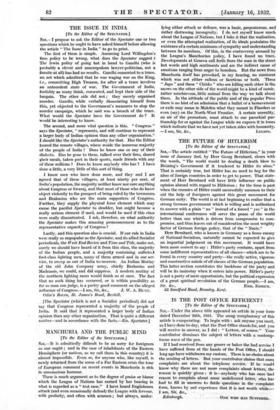THE ISSUE IN INDIA_
[To the Editor of the SPECTATOR.] fine —I propose to ask the Editor of the Spectator one or two questions which he ought to have asked himself before allowing the article " The Issue in India " to go to print.
The first of these is simple. Assuming Lord Willingdon's firm policy to be wrong, what does the Spectator suggest ? The Irwin policy of going hat in hand to Gandhi (who is probably a clever and unscrupulous lawyer-politician, not a fanatic at all) has had no results. Gandhi consented to a truce, an act which admitted that he was waging war on the King, i.e., committing High Treason, for after all a truce involves an antecedent state of war. The Government of India, foolishly as many think, consented, and kept their side of the bargain. The other side did not ; they merely organised murder. Gandhi, while verbally dissociating himself from this, yet objected to the Government's measures to stop the murder campaign, which he said was a breach of the truce. What would the Spectator have the Government do ? It would be interesting to know.
The second, and more vital question is this. " Congress " says the Spectator," represents, and will continue to represent a larger body of Indian opinion than any other organization." I should like the Spectator's authority for that. Has the Editor toured the remote villages, where reside the immense majority of the people of India ? Does he know one or any of their dialects. Has he gone to them, talked over their fires, shared their meals, taken part in their sports, made friends with any of these millions ? Does he know anybody who has ? I have done a little, a very little of this, sort of thing.
I know men who have done more, and they and I are agreed that of these villagers, at least ninety per cent, of India's population, the majority neither know nor care anything about Congress or Swaraj, and that most of those who do know object violently to the prospect of being ruled by the townsmen and Brahmins who are the main supporters of Congress. Further, they supply the physical force element which may cause the pacifist Spectator to shudder, but might become a really serious element if used, and would be used if this class were really discontented. I ask, therefore, on what authority the Spectator makes this amazing pronouncement as to the representative capacity of Congress ?
Lastly, and this question also is crucial. If our rule in India were really as unpopular as the Spectator, and its allied Socialist periodicals, the Week End Review and Time and Tide, make out, surely we should have heard of it from this class, the majority of the Indian people, and a majority containing sufficiett first-class fighting men, many of them armed and in our ser- vice, to sweep us out of India to-morrow. An Indian Mutiny of the old John Company army, chiefly Brahmins and Madrassis, we could, and did suppress. A modern mutiny of the northern fighting races would finish us at once. The fact that no such thing has occurred, or is within possibility as far as man can judge, is a pretty good comment on the alleged {The Spectator (which is not a Socialist periodical) did not say that Congress represented a majority of the people of India. It said that it represented a larger body of Indian opinion than any other organization. That is quite'a different matter—and in accordance with the facts.—En. Spectator.]


































 Previous page
Previous page